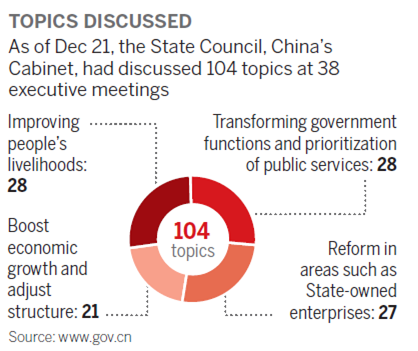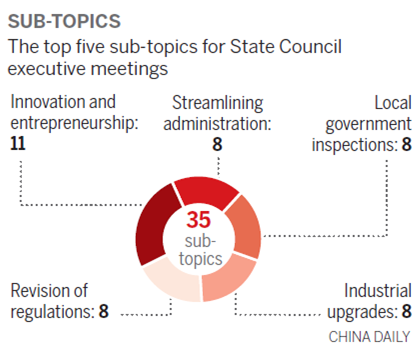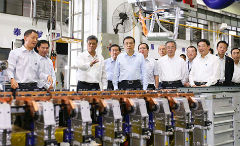Premier Li calls on entrepreneurs and innovators to drive growth
2016-12-29
China Daily
On April 25, a large crowd scrambled into an open courtyard and waited breathlessly to witness a badminton exhibition between Premier Li Keqiang and the Robomintoner, a rectangular platform equipped with optical lenses, spherical wheels and two badminton rackets. It is the first intelligent machine in the world to play the game.
While some observers at the event in Chengdu, the capital of Sichuan province in Southwest China, marveled at the robot’s abilities, many more were busy filming the contest on their cellphones.
The robot returned the Premier’s first serve perfectly, but it failed to hit the second shuttlecock over the net, which resulted in a tied game, according to Huang Shan, general manager of Chengdu Champion Robot Technology Co, which manufactures the Robomintoner. Huang stood beside Premier Li to introduce the robot and its functions.
The badminton game quickly earned the robot enormous popularity online and also spurred sales. So far, the company has sold more than 120 of the robots, which cost 400,000 yuan ($57,000) each.
Praised by the Premier for its core technologies, the Robomintoner uses human-computer interaction and cloud control to perform intelligent, autonomous operations that allow it to train amateur players and provide practice for veterans.
The technology for the robot was developed by a group of professors and students at the University of Electronic Science and Technology of China in Chengdu.
Recognition
The game was the highlight of the Premier’s visit to a business startup center in Jingrong, a town in what was then Pixian county. Earlier this month, the county, 30 kilometers from Chengdu’s downtown, was renamed Pidu district in recognition of its growing economy and population.
In 2014, many buildings in the center’s courtyard were left vacant when Foxconn Technology Group, an electronics company from Taiwan, moved its factory to Henan province, resulting in the departure of 30,000 workers.
Early last year, a decision was made to convert the residential complex into offices for startups, which can use the facilities free-of-charge for the first three years and are provided with free utilities.
To help the startups survive the embryonic stage, the district established a fund of 1.3 billion yuan ($187 million), and also arranged for the companies to use technologies developed by researchers at 18 universities and colleges near Jingrong.
So far, more than 10,000 people from first-tier Chinese cities and overseas have gathered in the small town and established more than 850 startups. Local officials are delighted that the businesses are registered in their area because the companies will pay taxes to the local government when they eventually start making profits.
The Premier likened the changes-converting vacant buildings into enterprise bases-to the way new-economy companies go public via reverse mergers with companies in traditional industries.
New sectors, such as big data, are also thriving in Jingrong. Premier Li was especially interested in two indexes, established by the University of Electronic Science and Technology and the State Information Center, that chart the development of new-economy companies and startups, when he visited their offices ahead of the badminton game.
When the indexes’ chief analysts requested that the government share more information about the new industries, Premier Li said the indexes should be improved so they could act as reference points and help the government to formulate policies and decisions.
Demonstration areas
In May, a month after Premier Li’s visit, Pixian became the first county in China to be listed as one of 17 innovation and entrepreneurship demonstration areas, along with Haidian district in Beijing, and Yangpu in Shanghai.
Premier Li’s visit to Jingrong underscored his interest in innovation and entrepreneurship and the high priority he gives them.
Innovation and entrepreneurship will aid the exploration of new technologies and help to establish new businesses.
That will help the country to upgrade its industrial structure from low- to high-end, according to Ma Baocheng, a professor of public management at the Chinese Academy of Governance.
More jobs will be created by these new businesses and technologies, which may help to provide work for the record 12.5 million students who graduated from the nation’s colleges and vocational secondary schools this year, he added.
High-tech enterprises and startups have featured regularly on the premier’s schedules during his visits to 10 provinces and autonomous regions this year.
Stranglehold broken
On Aug 23, Premier Li visited Lattice Power Co, a leading manufacturer of LED chips in Nanchang, the capital of Jiangxi province. The company broke the technological stranglehold of Japan and the United States with patented technologies that imprint luminescent materials on silicon chips, saving energy and money.
The company’s original technologies, which won first prize at the 2015 National Technology Invention Award, were the result of 10 years of work by Jiang Fengyi, a professor of semiconductor research at Nanchang University.
Clad in white dust-proof coveralls, Premier Li examined the entire production process in the company’s workshops, and encouraged Jiang and his employees to establish their own brand in the domestic and international markets when they transform their technological expertise into productivity.
Looking at the wider picture, Chen Fengying, who researches the global economy at the China Institute of Contemporary International Relations in Beijing, said innovation and entrepreneurship will benefit the national “Made in China 2025” strategy, which aims to promote equipment manufacturing and the export of high-end equipment to explore new market potential in the weakest global trading environment for 30 years.
The major tasks of the State Council this year




